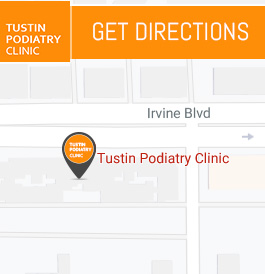Key Questions to Ask Your Podiatrist
Podiatrists treat a wide range of foot and ankle diseases, including corns, calluses, discomfort, and diabetic foot. Dr. Charles Baik, DPM, of Tustin Podiatry Clinic specializes in the evaluation and management of foot and ankle issues in order to encourage long-term wellness. Contact us for more information or schedule an appointment online. We are conveniently located at 17400 Irvine Blvd. Suite H, Tustin, CA.


Table of Contents:
What should I do if I have a concern that a bunion is forming?
What is the difference between over the counter and custom fit orthotics?
What are the main differences between an orthopedic surgeon and a podiatrist?
Do the socks I wear make a difference?
What information should I share with my podiatrist?
Do I need a referral to see a podiatrist?
Podiatrists can help with fix many issues you have with your feet, ankles and legs without the need for invasive surgery. Often a podiatrist is the best place to start if you are experiencing a medical problem with your feet and ankles. Dr. Charles Baik has successfully treated many patients suffering from pain and discomfort and got them walking comfortably again. Some patients are afraid to go to a podiatrist because they are unsure of what they do. Here are some important questions to ask that can relieve some of the common misconceptions.
Despite some misconceptions, bunions are usually hereditary, and they do not require amputation to fix them. The key to treating bunions is early detection. The sooner you see a podiatrist for bunion treatment, the easier it is for your podiatrist to fix the problem. One of the best things you can do is look at your children. If you know your family has a history of bunions, take them to see a podiatrist early on, this can help ensure that they are looked after from an early age so that they do not develop bunions later in life.
Over the counter orthotics are a bit of a gimmick. They can help if you need some extra padding and arch support. For example, if you work a job where you have to stand all day in dress shoes, they are likely better than nothing, but they are still nothing like custom made orthotics. Custom made orthotics are created after your podiatrist has made a mold of your feet and seen the way you walk. They are designed to correct the specific biomechanics of the way you walk. Many people don’t realize that having the right pair of orthotics is as important as having the right prescription for eyeglasses, it makes a world of difference when it’s tailored to your specific needs.
While podiatrists and orthopedic surgeons treat many of the same foot and ankle conditions, their specializations and training are quite different. While orthopedic surgeons manage the aspects of the bones, soft tissues, and joints pertaining to the foot and ankle, podiatrists manage all of these same aspects, but they also look at the biomechanics and dermatology of the foot. Sometimes, the problem can be corrected simply by looking at and working on the daily biomechanics of the foot and ankle, and a podiatrist can often help correct the problem without the need for surgery.
Yes, putting on a clean pair of socks everyday makes a huge difference in the health of your feet. Scientists have found that people who wore socks instead of going barefoot and put a clean pair of socks on everyday were 100 times less likely to develop fungal foot infections than those who don’t. By wearing socks in your shoes and changing them regularly you can avoid many common fungal and bacterial infections. Socks are a good thing for patients looking to fix biomechanical issues, as well as there are specialized socks that can be worn to help patients suffering from various foot and ankle conditions. Most importantly, socks also help keep your feet warm in the winter and protect them from frostbite, but we don’t need science to help us prove that theory.
It is important to make sure that your podiatrist has the right information to help diagnose and treat your condition. Make a list of your symptoms and questions, so it can help your foot doctor to make a diagnosis and help you feel more comfortable during the process. Share with your foot doctor any medications you are taking and inform them of any past surgeries you have had. You can gather and bring any past medical records including X-Rays, lab results and MRI’s pertaining to your feet so that your foot doctor has all of the tools they need to help treat your condition. If the problem is related to walking and exercising, bring the shoes you would normally wear for these activities with you for the foot doctor to see and access you.
You do not need a referral from a physician in order to see a podiatrist. You can book an appointment and see one if you feel that will be what is best for you. However, some insurance companies do require you to have a physician referral in order to pay your claim for insurance services with a podiatrist. It is best to check with your insurance company beforehand, so that you can get the correct information and referral if needed before booking an appointment with your podiatrist. If you don’t have insurance, call us our podiatry clinic to learn about our self-pay options. You can also schedule an appointment online. We serve patients from Tustin CA, Irvine CA, Garden Grove CA, Orange CA, Anaheim CA, Costa Mesa CA, and Lake Forest CA.

Additional Services You May Need
▸ Heel Pain Treatment
▸ Laser Fungal Nail Treatment
▸ Ingrown Toenail Treatment
▸ Ankle Sprain Treatment
▸ Foot and Ankle Medicine & Surgery
▸ Orthotics Custom
▸ EPAT/Shockwave Therapy
▸ Hammertoe
▸ Arthritis Treatment
▸ Diabetic Foot Care
▸ Flat Feet Treatment
▸ Foot Warts Treatment
▸ ClarixFlo





